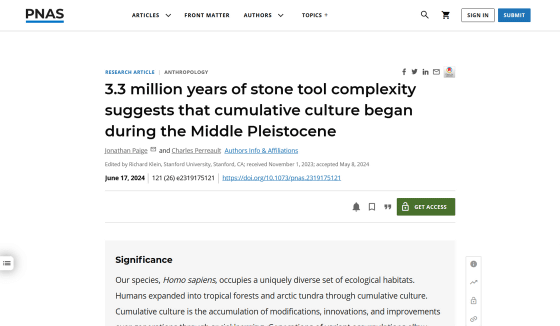Analysis of stone tools reveals that humans began rapidly accumulating technological knowledge through social learning around 600,000 years ago

By accumulating and passing on a wide variety of knowledge over the years, humans have built a culture that could not have been created by the power of an individual alone. A new study analyzing stone tools from the past 3.3 million years has concluded that 'humans began to rapidly accumulate technological knowledge about 600,000 years ago.'
3.3 million years of stone tool complexity suggests that cumulative culture began during the Middle Pleistocene | PNAS

ASU study points to origin of cumulative culture in human evolution | ASU News
https://news.asu.edu/20240617-science-and-technology-asu-study-points-origin-cumulative-culture-human-evolution
A Critical Boom in Technology Traced Back More Than Half a Million Years: ScienceAlert
https://www.sciencealert.com/a-critical-boom-in-technology-traced-back-more-than-half-a-million-years
One thing that sets humans apart from other primates is that we have a culture that has been built up over many years, and the inheritance of knowledge from past generations has allowed modern humans to enjoy the benefits of complex industrial products and social systems, even if they themselves do not possess a wide range of knowledge.
' Homo sapiens has successfully adapted to ecological conditions that require solving a wide variety of problems, from tropical forests to the Arctic tundra,' said Charles Perreault, an associate professor at the Arizona State University Institute of Human Origins . 'Human groups can quickly develop new, complex solutions to problems by building on and recombining solutions from previous generations. As a result, our culture has become too complex for individuals to invent on their own, from technological problems to organizational solutions.'

So Perrault and
The team classified 62 stone tools from 57 excavation sites according to the number of steps required to make each tool. The oldest stone tools used in the analysis were from Africa, but stone tools from Eurasia, Greenland, Oceania, and the Americas were also included in the analysis.
The analysis showed that during the period when early Australopithecus and other ancient hominins lived, from about 3.3 to 1.8 million years ago, stone tool production consisted of only one to six steps, but there was a slight increase in complexity between about 1.8 and 600,000 years ago, when the number of steps increased to four to seven.
A major change in the complexity of stone tool production occurred after about 600,000 years ago. The number of steps in stone tool production increased dramatically from 5 to 18, suggesting that humans began to build on the technological knowledge found in previous generations.
The photos below show, from the left, ' stone tools from about 1.9 to 1.65 million years ago ,' ' stone tools from about 700,000 years ago, ' and ' stone tools from about 300,000 years ago .' The newer the tools, the more complex the stone tools are. 'By about 600,000 years ago, human groups had begun to rely on unusually complex technologies, and the complexity continued to increase rapidly thereafter,' Page said. 'These findings are consistent with what we would expect to see in a human population that relies on accumulated culture.'

The research team argues that by accumulating modifications, innovations, and improvements to knowledge over several generations through social learning, it is possible to create technologies and know-how that exceed what an individual could invent in a lifetime. The accumulation of knowledge and the creation of culture improves problem-solving methods in a similar way to evolution by random mutation or natural selection, benefiting the group in various ways. It is also possible that as collective knowledge and related behaviors develop, genes that affect learning have become selectively dominant.
While this study provides evidence of an accumulated culture during the Middle Pleistocene , it is possible that knowledge accumulated much earlier in human evolution in a form that is not preserved archaeologically. 'Early humans may have relied on accumulated culture to develop complex social, foraging, and technological behaviors that are not visible archaeologically,' the team wrote in their paper.
Related Posts:
in Science, Posted by log1h_ik







